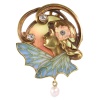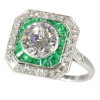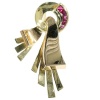Nu gespreide betaling mogelijk op het juweel van uw dromen! Vraag ons naar de details. Gratis verzekerde verzending van alle orders!

Antieke juwelen glossarium
(verklarende woordenlijst)
A - B - C - D - E - F - G - H - I - J - K - L - M - O - P - Q - R - S - T - U - V - W - X - Y - Z (alles)
Hermes
Hermes, in Greek mythology, is the Olympian god of boundaries and of the travelers who cross them, of shepherds and cowherds, of thieves and road travellers, of orators and wit, of literature and poets, of athletics, of weights and measures, of invention, of commerce in general, and of the cunning of thieves and liars.
The analogous Roman deity is Mercury. The Homeric hymn to Hermes invokes him as the one :"of many shifts (polytropos), blandly cunning, a robber, a cattle driver, a bringer of dreams, a watcher by night, a thief at the gates, one who was soon to show forth wonderful deeds among the deathless gods."
Hermes' iconography
Hermes was usually portrayed wearing a broad-brimmed traveler's hat or a winged cap (petasus), wearing winged sandals (talaria), and carrying his Near Eastern herald's staff, either a caduceus entwined by serpents, or a kerykeion, a (sometimes) winged staff with two snakes wrapped around it, topped with a symbol similar to the astrological symbol of Taurus the bull. Hermes wore the garments of a traveler, worker, or shepherd. He was represented by purses or bags, roosters and tortoises. When depicted as Hermes Logios, he was the divine symbol of eloquence, generally shown speaking with one arm raised for emphasis.
See also: Olympian gods
From: Wikipedia









